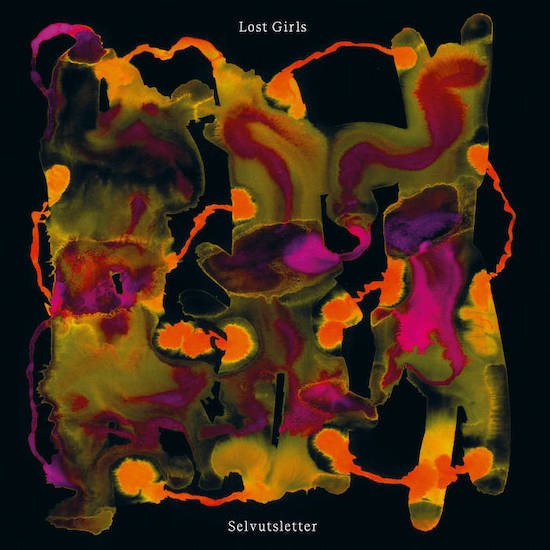I’ve never been suckered in by perfectionism. Most of the time, studio sheen is a total mood killer. Thousand-track, cocaine-fueled polish is for hi-fi shops and divorced dads. When every minute detail on an album sounds laboured over / over-considered, that thing isn’t rich with detail, buddy – it’s dead as a doornail. There’s a liveliness to immediacy that’s hard to beat with studio precision. Or with perfection, in general. Would you rather a pristine, crystalline take that’s technically brilliant; or one that’s technically somewhat flawed, but bloody and soaked in life?
I know which one I’d choose, and I’m pretty sure that Jenny Hval and Håvard Volden are on the same page. About a minute-fifteen into ‘Timed Intervals’, the opener of the duo’s second Lost Girls LP, Selvutsletter, Hval absolutely belts out the song’s titular phrase, hucks it into orbit from the back of her throat, and holds it, holds it, holds it until her voice goes hoarse, craggy and rough, before softening as she lingers on intervals for a couple of seconds. It’s gut-punch stuff.
And delightful. And surprising, although I suppose it shouldn’t be. I suppose Hval is more or less Indie Famous these days, something of a known quantity. Let’s face it: not even the wiliest artiste can be unpredictable all the time. Suffice it to say, Hval is known for that raw shit. Still, her most recent record under her own name, 2022’s Classic Objects, felt like a sort of reboot. Not as electronics-forward as the trio of LPs that preceded it, and hewing more closely to her 2018 EP, The Long Sleep, here was Hval with a groovy, pro-grade backing band, sounding like her own post-Blixa Bad Seeds. Her 4AD debut, it was a polished, assured album, albeit a bit adult contemporary. It was, in a word, tasteful, at least by Hval’s standards. But to these ears, ever so slightly bloodless. I know I’m in the minority here, but despite my best efforts, Classic Objects didn’t quite take.
I found myself gravitating back towards Hval’s prior work. Specifically, Menneskekollektivet, Lost Girls’ debut LP, which had come out about a year earlier, and is, perhaps, the best thing Hval has ever done – the highest water mark in a career full of high-water marks. Famously improvisational, Menneskekollektivet’s five tracks are an audacious experiment in first-thought-best-thought expansiveness. The duo is completely in sync, weaving around one another, highlighting each other’s strengths, Volden’s guitar perfectly complimenting Hval’s voice (and vice versa) and the club and krautrock-tinged tracks they occupy. Hval’s lyrics, both spoken and sung, often function like deeply moving monologues that linger well after the album is over. The LP – and project itself – felt free and open, full of possibility. That feeling, you’ll be glad to know, carries over into and all the way through Selvutsletter. And It’s apparent from the record’s very start.
I suppose it’s wrong of me to include Lost Girls in the same continuum as Hval’s solo work. It is a distinct project after all. At the same time, separating the two feels like insisting that Grinderman and the Bad Seeds be discussed in isolation from one another – if you’ll forgive continued Nick Cave comparisons. Although, I have always thought of Hval as a Cave-ian / no-wave-ian figure, and in that sense, Volden is not that unlike her Warren Ellis. Regular collaborators since Hval’s Rune Grammofon days, the two routinely bring out the best in each other, pushing one another deeper into new territory. With Selvutsletter, Lost Girls’ new territory is the pop nugget.
Which is a bigger challenge than you might expect. The key draw of Lost Girls thus far has been wide-open, long-form tracks that revel in sheer, transcendent duration. So, how do you distill that expanse, reduce that freedom, until it fits into a three, four, five-minute container without losing something? Who knows? I certainly don’t. But they’ve done it. Somehow, these songs are long in spirit, wide-open in vibe, allowing them to occasionally reach the absurd heights of Menneskekollektivet’s title track or ‘Love, Lovers’ in a third of the time. “Occasionally” might be an understatement, honestly. It’s almost routine. Such is the case for the opening trio of ‘Timed Intervals’, the insistent repeat-o jangler ‘With The Other Hand’, and the Siouxsie And The Banshees-invoking ‘Ruins’ – and a clutch of other tracks throughout the album.
Hval and Volden capture that aforementioned feeling of freedom, too, through genre-defying playfulness and impish-but-loving references peppered throughout the record. ‘June 1996’ basically dares listeners not to think of The Sundays, and there’s something lovely about that. A generational talent, until now Hval – and by extension Lost Girls – has, in a strange way, seemed to exist outside of musical context. Or maybe adjacent to it. With Selvutsletter, Lost Girls, at least, are proactively inserting themselves into a particular pop-music lineage, telling their own story, telling us where they fit. And like everything else they’ve done, it doesn’t sound limiting or calculated or agonised over – it just sounds vibrant and magical.



